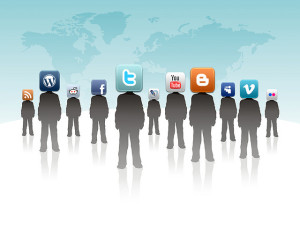What are the top Social Media Concerns for HR Professionals?
 It is safe to say that the use of social media by Human Resource (HR) professionals is not a passing trend, but there are certain social media concerns for HR professionals that inspire a degree of caution when these internet tools are used for business operations.
It is safe to say that the use of social media by Human Resource (HR) professionals is not a passing trend, but there are certain social media concerns for HR professionals that inspire a degree of caution when these internet tools are used for business operations.
HR managers are often the gatekeepers for employment opportunities, the key representatives of a company’s brand at recruiting functions and the proponents of organizational learning initiatives. Social media extends their reach to a broader, more diverse group of applicants while at the same time giving them tools to focus their search for talented professionals based on advertised skill sets. Social media tools also make launching and monitoring professional development campaigns for current employees more efficient. Even with all of these enhancing features, the Society for Human Resource Management reported that nearly 40 percent of companies that responded to their survey about HRM social media indicated that they felt the need to adopt special company policies regarding the use of social media for both HR managers and company employees. Here are some of their concerns.
Peering Into the Private Lives of Potential Employees
Social Media platforms like Twitter and Facebook offer ways for friends and acquaintances to relax and share details about their lives. This is done quite freely among members that are friends and followers on these platforms because that was the original purpose of those sites. The professional social media platform leader is arguably Linked In which is used extensively by HR managers to recruit and advertise jobs. The situation gets dicey when HR managers identify potential job candidates on Linked In and then seek more information about them via personal social media sites like Facebook, Instagram and Twitter. The problem is that an HR professional is often privy to information that they do not need to make ethical decisions in their role as employment gatekeeper. More times than not, these personal social media sites cast employees in a less than professional light because of the nature of the sites. Even though it may be hard to prove, the HR professional may be vulnerable to accusations of discrimination or other legal issues because of the information to which they have access.
Doing Damage Control For Social Media
HR professionals also use social media for organizational development, training activities and to promote employee engagement. However, their job function also involves protecting the company brand to a certain extent. Social media becomes a double edged sword when employees engage and express negative feedback about the company online. This is a dilemma when the company has no intention of enacting change regarding the employees’ complaint and all will know about it if senior leadership or HR does not respond appropriately. Also, authentic employee engagement may cease if employees’ comments or complaints are completely censored or removed from online conversations.
Warning Employees About Their Rights When using Social Media At Work
Many companies also feel obligated to place warnings within their social media policies about the appropriate use of the tool at work. While they are encouraged to converse positively about work related topics via social media, employees also have access to their personal contacts. These friends and acquaintances on social media platforms like Facebook, Twitter and Instagram could be sources of illicit or inappropriate material. They could also compromise some of the company’s network security features through hacking and data theft. In these cases, indiscrete employees could find their jobs in jeopardy when companies lay strict ground rules for social media use.
Conclusion
As in the field of business marketing, social media has some amazing opportunities for HR professionals. However, they still have ethical and legal obligations to follow like Equal Employment Opportunity, the National Labor Relations Act and other labor laws. The key social media concerns for HR professionals remain the ones pertaining to the ethical access and use of personal information in a work place setting.